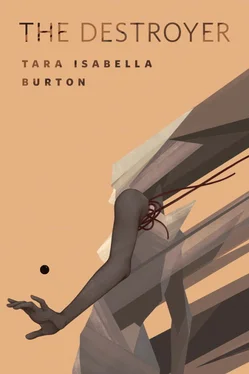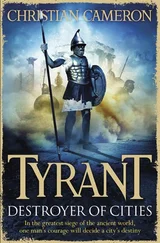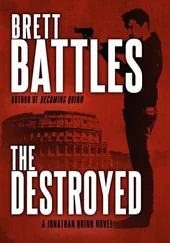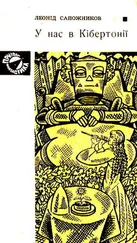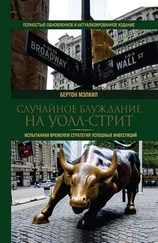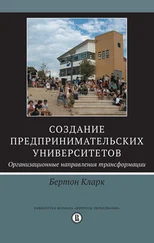Tara Isabella Burton
THE DESTROYER
I.
Long before my mother destroyed the world, her experiments were quieter, more contained. They did not obliterate continents. They did not rack up the dead.
She began as a domestic researcher in the household of an Umbrian merchant, engineering fish with mirrored scales. She told me how he loved to see his own face reflected, one and then a thousand and then another hundred times; how he filled the fountains with so many that there was no room to breathe or swim; how she woke up one morning to find that they had devoured one another, and left the fountains overflowing with blood.
He did not recognize her genius. For him she was only a carnival magician: a maker of flower stems that shattered like glass, and three-headed dogs, and the many-faced prisms that years later gave me nightmares of mirrors that did not end. Women’s work, he said. Not science.
So she moved on. She spent five years in Friuli, making nuclear lamps that waxed and waned with the moon, and another three in Milan, where she throttled sunflowers until they bore fruit. She sold the formula to a senator’s wife, and in six months’ time the whole Republic stank of them: of that peculiar mixture of honey and raw meat that I associate with her even now.
“All idiots,” she told me once. “They’d have slurped slop from a trough if they thought I’d invented it.”
She worked for provincial governors, for senators; she sold drugs to generals that lured soldiers into the fata morganas of the sands; she provided one of Caesar’s chief ministers with a device that would allow him to press his ear against a cube made of glass, and through it listen to his enemies’ dreams.
“They didn’t understand,” she used to tell me as she tightened the bolts in my shoulder. “They patted me on the head, slipped me some money. They thanked me and went on their way—and didn’t even think to tell Caesar what I’d done. But I showed them, didn’t I?”
In me she found an outlet for her genius. Into me she’d poured all her knowledge, molten with need; she had taken cells from her ribs and fiddled with them under a microscope; five months later, gelatinous and gasping for breath, I was. It made the papers—I was the first parthenogenesis, the daughter without a father, the flesh of my mother’s flesh. I was proof of her greatness.
From the beginning, I was taller than she was.
For the first six months there were papal picketers outside our laboratory, demanding that I be drowned, and old women in the marketplace swore that when my mother passed them by, they developed boils on the soles of their feet.
“Of course, they all wanted to know how I’d done it,” my mother said to me. “But I never told them. You’re mine—and only mine. Nobody else knows how to make you.” She used to cradle me against her breasts; it calmed me long enough for her to clean the copper at my wrist.
Within three months she had been offered a state position in one of Caesar’s laboratories on the outskirts of the city.
“It took us five years,” she said. “But he noticed me at last. You see what you’ve done?” She kissed me on the forehead. “You are my greatness. And I love you for it.”
So she loved me. On Saturdays she took me to the Hippodrome; she sat in the umbrella shade and watched me as I chased eagles and got mud on my shoelaces. Her suit was blue and her hair was long and light behind her, and when her gaze enveloped me, I knew there was no other woman in the world.
My eyes were her eyes. My lips were her lips and my shoulders, too, were hers, and so the world was geometrically composed, and everything I ever was or would become was threaded in me already, and manifest in her.
One day she took me to lunch at the senatorial haunt on the Capitoline, where the names of Caesar’s chief scientists were inscribed upon the ministry gates. We sat together in silence, staring at our unfilled plates, and watched the servants scurry as they ferried platters into the back room.
“Caesar’s in there, I suppose,” my mother said. “They’re always so nervy when he’s around.” She fingered the rose the waiters had left on the table for us, divesting it of thorns.
“They want to impress me,” she said to me. “They must know who I am.” She considered it. “They think they can impress me with this?” Her laugh was hollow and cruel. “It doesn’t interest me. Just think if each petal were a different color—how much better it would be, then. One lime colored, one magenta, one orange, one black.” She tore them off and pressed them into my hands, and my fingers grew sticky and sickly with the smell. “Get these out of my sight.”
That night I crept out of my bedroom and made my way to the garden of our courtyard, and there I uprooted every stem and set them all on fire before the statues of the household gods. My mother found me in the morning, smeared in ash; she said nothing but made us breakfast and spooned extra honey onto my plate.
On Sundays we went to the Forum. We sat together on the pillars; she spread cheese on bread and commanded me to play. I clambered over the columns, tripping in the enormity of the spaces between them. We played hide-and-seek around the arches of the Colosseum; she always found me, and there gathered me in her arms.
The tourists did not disturb us; Caesar’s guards did not disturb us. Nobody existed there but the two of us, who were really one. In our happiness everything outside us, everything alien to our secrets, was blotted out—or else I do not remember it.
When I was thirteen my mother developed an artificial arm. It was opal-pale and gleamed; it could bend without breaking. It could lift four or five hundred kilograms without effort; knives slashed forth from a slit in the palms on command.
“For protection,” my mother said. She took my hand in hers and pressed the palm to her lips. “I was never so strong, you know,” she said. “My arms were never beautiful. They were freckled.” She turned my hand over, feeling her way through my knuckles. “Yours will be too, in this heat. You’ll have to wear sleeves like mine.” I let her run her fingers through my hair. “You’re so lovely,” she said. “When I was fourteen, maybe I was so lovely too. I don’t remember. It was a long time ago, and I try not to think about it much. But there’s so much I want to give you. If you wanted. Only if you wanted.”
I could see no fault in her, nor any ugliness, though I stood naked all night in front of the mirror, looking at my arm from every angle, pressing it up against my ribs to spread the fat like soft cheese across my side. I kneaded the flesh and picked at the skin and in the morning I asked her to give me the arm she had made.
She kissed me. “I knew you would understand,” she said.
The operation went quickly. I felt nothing, but through the haze I remember that I heard her singing, a song in the vulgar tongue that was spoken only in the provinces, which she must have known as a girl.
Fa la ninna, fa la nanna
nella braccia della mamma
Fa la ninna bel bambin
nella braccia della mamma
When I woke, she was holding a hand that now belonged to me—though I did not feel it—and stroking my forehead with the back of her hand.
“You’re so lovely,” she said, and took me in her arms.
She taught me how to use it: how to hoist myself up single-handed on bars of steel, how to throw javelins made of osmium and catch discs weighted down with lead. She watched as I grew coltish and strong, as I shook out my hair and my cheeks flushed pink with intoxicating strength; she watched me and took photographs, measurements, and hung these on her laboratory walls.
Читать дальше
